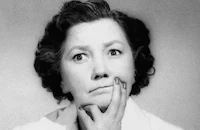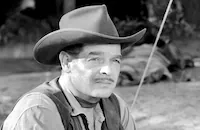Wake Up and Live
Cast & Crew
Sidney Lanfield
Walter Winchell
Ben Bernie & Orchestra
Alice Faye
Patsy Kelly
Ned Sparks
Film Details
Technical Specs

Synopsis
At the entrance to the Hi-Hat Club in New York, where Ben Bernie and his band are appearing, a select number of insults regarding Bernie are offered for public enjoyment by Bernie's "pal," gossip columnist Walter Winchell. During his next radio broadcast, Bernie quips about Winchell, then listens to Winchell, in his own broadcast, rib him. When Winchell learns that Eddie Kane, the brother of his assistant Patsy, is arriving in town with his vaudeville partner, Jean Roberts, Winchell puts an extremely favorable notice about them in his column, to play a joke on agents, especially Gus Avery, who has tried to bribe him. Upon the arrival of their train, Eddie and Jean are greeted by swarms of agents, and Jean signs with Avery, who has brought her flowers. Before their audition at a radio station, Eddie witnesses an opera singer faint from "mike fright," and when he and Jean begin their number, he imagines the microphone change into a devil breathing smoke, and then faints himself. Because of his mike fright, Jean leave him to solo. Eddie then gets a job through Patsy as a guide at Radio Center. After he takes visitors to view a broadcast of Alice Huntley singing the inspirational song "Wake Up and Live," Alice agrees to help him get over his mike fright. Later, during a broadcast of Bernie's band from the Hi-Hat Club, Eddie wanders into a vacant studio and sings with the band into a mike, which, unknown to him, is hooked up to the broadcast. Listeners, including Bernie, Winchell, Alice and her boss, James Stratton, the head of Radio Center, are impressed with this new voice, and when Bernie confesses to Stratton that he does not know the identity of the singer, Stratton decides to play up the mystery for publicity. The next night at the club, Bernie introduces a masked crooner as "The Phantom Troubadour," but Winchell unmasks him as a well-known singer. Later, when Eddie sings for Alice, she recognizes his voice as the Phantom's and records it onto a phonograph record without his realizing it. She plays the record for Stratton and Bernie and then has them arrange a remote control hook-up from her apartment, so that when Eddie goes there for help, she can convince him to pretend that he is singing on the radio and actually have him sing into a live mike for the broadcast. The plan works, and Winchell orders his assistant Steve Cluskey, who is Patsy's fiancé, to find Eddie. Meanwhile, Jean recognizes Eddie's voice, and Avery orders her to go back to him. Steve finds out about the broadcasts from Alice's apartment, and Winchell convinces Eddie to sing on his program before the opening of the new Manila Club, as a build-up for Alice. After Jean and Avery locate Eddie, Avery has him kidnapped. Avery then tries to blackmail Winchell by threatening to turn Eddie over to Bernie unless Winchell pays him. Winchell, however, tells Avery that Eddie is the wrong man and to prove it, plays Alice's recording on his show to make it appear that Eddie is in the studio. Avery then tears up the contract that he forced Eddie to sign and releases him. Eddie hitchhikes back to town and goes to the Manila room, where Winchell informs him that he is the Phantom. Although he is overcome at first with mike fright, Eddie is finally able to sing over a microphone, while Bernie and Winchell make up.

Director
Sidney Lanfield
Cast
Walter Winchell
Ben Bernie & Orchestra

Alice Faye

Patsy Kelly

Ned Sparks

Jack Haley

Walter Catlett
Grace Bradley

Joan Davis
Leah Ray

Miles Mander

Douglas Fowley

Etienne Girardot
Barnett Parker
Paul Hurst

Warren Hymer
Condos Brothers
Brewster Twins

William Demarest
John Sheehan

George Givot
Ed Gargan

Robert Lowery
Charles Williams
George Chandler
Gary Breckner
Rosemary Glosz
Crew
Edward Cronjager
Haldane Douglas
A. F. Erickson
W. D. Flick
Mack Gordon
Roger Heman
Curtis Kenyon
Mark-lee Kirk
Thomas Little
Kenneth Macgowan
Harry Revel
Louis Silvers
Robert Simpson
Jule Styne
Harry Tugend
Gwen Wakeling
Jack Yellen
Darryl F. Zanuck

Film Details
Technical Specs

Quotes
Trivia
Jack Haley's singing was dubbed by Buddy Clark (I).
Notes
Variety noted that this film had "perhaps the most auspicious build-up ever attendant to any motion picture production-a well publicized and thoroughly familiar pseudo-'feud' between Walter Winchell and Ben Bernie, the cast toppers of the film, plus repeated radio heralding." New York Times noted that the film "comes at a time when a radio comedian isn't a radio comedian unless he's insulting some other radio comedian." New York Times also stated that because Bernie was inclined to blow his lines, director Sidney Lanfield allowed him to use his own words provided the substance was correct. Winchell, reportedly, contributed to Bernie's discomfort from behind the camera. Motion Picture Herald noted that "the production has received more than the usual amount of personal attention from Darryl F. Zanuck," who, Motion Picture Herald stated, selected the story vehicle and chose the cast, songwriters and directors. According to a October 1936 Hollywood Reporter news item, Eddie Cantor was originally scheduled to star with Winchell and Bernie. According to a late December 1936 Hollywood Reporter news item, Claire Trevor was set to play to female lead. Variety credited Buddy Clark, a radio singer, with uncredited off-screen singing for Jack Haley in the film. Critics commented favorably on Haley's singing and performance: Variety stated, "For Haley, this picture has excited much sudden highly favorable comment in film circles....the Haley furore amounts to something closely resembling belated recognition." This film marked composer Jule Styne's first work in films; he was the vocal supervisor on the film. Motion Picture Herald's "In the Cutting Room" column lists Eric Linden as a cast member, but his participation in the final film has not been confirmed. According to information in the MPAA/PCA Collection at the AMPAS Library, this film was banned in Germany during 1937 and 1938.












